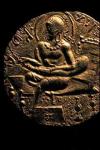Biography
Samudra Gupta (Bengali: ??? ?????? ?????) was an Bangladeshi poet and journalist. Gupta was a strong critic of both communalism and Islamic fundamentalism, and expressed his opposition to these ideologies within his writings.
Gupta was born Abdul Mannan in Hashil village in Sirajganj District. Mannan adopted the pseudonym of Samudra Gupta during the 1960s and was widely recognized by his pen name during his life and career. He took part in the start of the uprising against Pakistan beginning in 1969 and fought in the Bangladesh Liberation War.
Gupta was originally a journalist by profession. He worked as different daily and weekly newspapers throughout Bangladesh. Gupta also served as the general secretary of the country's National Poetry Council.
He wrote thirteen books of poetry during his career, as well as one work of fiction and an additionally book of poetry as a collaboration with another writer. he also released many articles and short stories and served as the editor of several books.
Gupta's most famous writings include Rode Jholshano Mukh, Swapnamongol Kabyo, Ekhono Utthan Achhey, Chokhey Chokh Rekhey, Ekaki Roudrer Dike and Shekorer Shokey. His writings have been translated from Bengali into Chinese, French, Sinhalese, English, Hindi, Japanese, Urdu, Norwegian and Nepali.
He was a recipient of the Jessore Literature Award and the Humayun Kabir Award for literature. Additionally, Gupta was also awarded the Poet Vishnu Dey Award and the Language Day Honour by the government of the Indian state of Tripura.
Samudra Gupta died of gallbladder cancer at the Narayana Hridayalaya Hospital in Bangalore, India. He had been hospitalized in India for treatment since July 3, 2008. Gupta, who was 62 when he died, was survived by his wife and two daughters.He was buried at Mirpur Martyred Intellectuals' Graveyard.
Tributes flowed for Gupta from across Bangladesh. The Primary and Mass Education Adviser Rasheda K Chowdhury was quoted in a statement as saying that, "The nation has lost a renowned poet." The leaders of the Bangladesh Udichi Shilpigoshthi noted that Gupta's "fervent writing against communalism, fundamentalism and imperialism would remain alive for all the progressive people in the country" and hoped that his poems would continue to inspire democratic reforms throughout Bangladesh. ..






